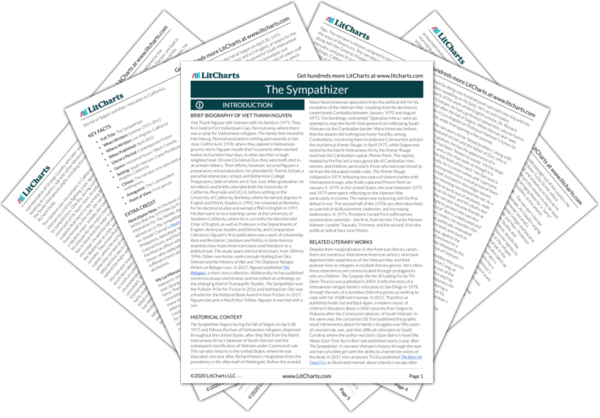Man / The Commissar Quotes in The Sympathizer
Chapter 4 Quotes
But out of deference to our hosts we kept our feelings to ourselves, sitting close to one another on prickly sofas and scratchy carpets, our knees touching under crowded kitchen tables on which sat crenellated ashtrays measuring time’s passage with the accumulation of ashes, chewing on dried squid and the cud of remembrance until our jaws ached, trading stories heard second- and thirdhand about our scattered countrymen. This was the way we learned of the clan turned into slave labor by a farmer in Modesto, and the naive girl who flew to Spokane to marry her GI sweetheart and was sold to a brothel, and the widower with nine children who went out into a Minnesotan winter and lay down in the snow on his back with mouth open until he was buried and frozen and the ex-Ranger who bought a gun and dispatched his wife and two children before killing himself in Cleveland […] and the spoiled girl seduced by heroin who disappeared into the Baltimore streets […]
Chapter 11 Quotes
It mattered not what story these audiences watched. The point was that it was the American story they watched and loved, up until the day that they themselves might be bombed by the planes they had seen in American movies [….] Perhaps the Movie itself was not terribly important, but what it represented, the genus of the American movie, was. An audience member might love or hate this Movie, or dismiss it as only a story, but those emotions were irrelevant. What mattered was that the audience member, having paid for the ticket, was willing to let American ideas and values seep into the vulnerable tissue of his brain and the absorbent soil of his heart.
Chapter 14 Quotes
That very night, we snuck out of our dormitory and made our way to a tamarind grove, and under its boughs we cut our palms. We mingled our blood once more with boys we recognized as more kin to us than any real kin, and then gave one another our word.
Chapter 20 Quotes
We're revolutionaries, my friend. Suffering made us. Suffering for the people is what we chose because we sympathized so much with their suffering […] Only without the comfort of sleep will you fully understand the horrors of history. I tell you this as someone who has slept very little since what has happened to me. Believe me when I say that I know how you feel, and that this has to be done.
Somebody must have something done to him! Was I that somebody? No! That cannot be true, or so I wanted to tell him, but my tongue refused to obey me. I was only mistaken to be that somebody, because I was, I told him, or thought I did, a nobody. I am a lie, a keeper, a book. No! I am a fly, a creeper, a gook.
No! I am—I am—I am—
Chapter 21 Quotes
They were good students, just like me. They learned their lesson well, and so have I, so if you would please just turn off the lights […] if you would remember that the two of us were once and perhaps still are the best of friends, if you could see that I have nothing left to confess […] if I had become an accountant, if I had fallen in love with the right woman […] if my father had gone to save souls in Algeria instead of here […] if we had not fought a war against each other, if some of us had not called ourselves nationalists or communists or capitalists or realists […] if history had never happened, neither as farce nor as tragedy, if the serpent of language had not bitten me, if I had never been born, if my mother was never cleft, if you needed no more revisions, and if I saw no more of these visions, please, could you please just let me sleep?
Chapter 23 Quotes
He was the commissar but he was also Man; he was my interrogator but also my only confidant; he was the fiend who had tortured me but also my friend. Some might say I was seeing things, but the true optical illusion was in seeing others and oneself as undivided and whole, as if being in focus was more real than being out of focus. We thought our reflection in the mirror was who we truly were, when how we saw ourselves and how others saw us was often not the same. Likewise, we often deceived overselves when we thought we saw ourselves most clearly.
I was that man of two minds, me and myself. We had been through so much, me and myself. Everyone we met had wanted to drive us apart from each other, wanted us to choose either one thing or another, except the commissar. He showed us his hand and we showed him ours, the red scars as indelible as they were in our youth. Even after all we had been through, this was the only mark on our body.












